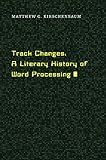Track Changes : A Literary History of Word Processing / Matthew G. Kirschenbaum.
Material type: TextPublisher: Cambridge, MA : Harvard University Press, [2016]Copyright date: ©2016Description: 1 online resource (368 p.) : 22 halftonesContent type:
TextPublisher: Cambridge, MA : Harvard University Press, [2016]Copyright date: ©2016Description: 1 online resource (368 p.) : 22 halftonesContent type: - 9780674969469
- 005.52 23
- Z52.4 .K57 2016eb
- online - DeGruyter
| Item type | Current library | Call number | URL | Status | Notes | Barcode | |
|---|---|---|---|---|---|---|---|
 eBook
eBook
|
Biblioteca "Angelicum" Pont. Univ. S.Tommaso d'Aquino Nuvola online | online - DeGruyter (Browse shelf(Opens below)) | Online access | Not for loan (Accesso limitato) | Accesso per gli utenti autorizzati / Access for authorized users | (dgr)9780674969469 |
Frontmatter -- Contents -- Preface -- Introduction: It Is Known -- 1. Word Processing as a Literary Subject -- 2. Perfect -- 3. Around 1981 -- 4. North of Boston -- 5. Signposts -- 6. Typing on Glass -- 7. Unseen Hands -- 8. Think Tape -- 9. Reveal Codes -- 10. What Remains -- After Word Processing -- Author’s Note -- Notes -- Credits -- Index
restricted access online access with authorization star
http://purl.org/coar/access_right/c_16ec
Writing in the digital age has been as messy as the inky rags in Gutenberg’s shop or the molten lead of a Linotype machine. Matthew Kirschenbaum examines how creative authorship came to coexist with the computer revolution. Who were the early adopters, and what made others anxious? Was word processing just a better typewriter, or something more?
Mode of access: Internet via World Wide Web.
In English.
Description based on online resource; title from PDF title page (publisher's Web site, viewed 01. Dez 2022)


